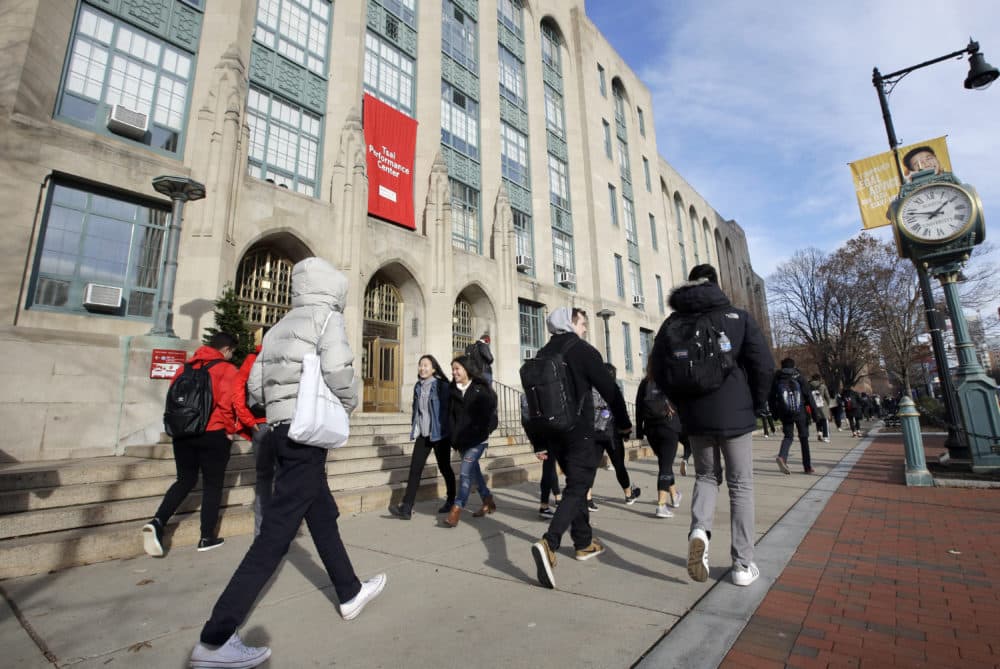Advertisement
Coronavirus Coverage
Colleges, Students Weighing Uncertainty In Fall Classes

Traditionally, May 1 is the deadline for students to send their deposits if they want to attend a particular college in the fall.
Some colleges have let the deadline slip to June 1 in recognition of the COVID-19 pandemic. The National Association of College Admissions Counselors lists more than 400 colleges that have changed their deadlines.
Among Massachusetts colleges: Ana Maria College, Bay Path University, and Williams College, all of which have pushed the deadline back to June 1.
Among the New England colleges that still require students to submit their deposits May 1 are Boston College, Boston University, Brandeis, the University of Connecticut, Wentworth Institute of Technology, and Wellesley College.
Joy St. John, the Dean of Admissions and Financial Aid at Wellesley, says one frequent question she and her staff get these days is whether accepted students can take a gap year. But not that many students have yet asked for the time off.
"We think the reason for that is that many of the gap-year programs students may have participated in, since many of them are overseas, that there are fewer of those opportunities available to students or that they're less attractive to students to consider even if they are available," she says.
But at other colleges, more students are asking for gap years. That's the case at Williams, where they're also seeing some currently enrolled students taking a leave next year.
Some colleges don't seem to be seeing much of a change in the number of students who are committing. Wellesley, for example, is planning a typical 600-student first-year class. As of Thursday, 500 students had made a deposit.
But a recent survey found that 12% of students who said they had made a deposit at a college said they have already changed their plans, and another survey found 20% of students saying they will change plans if their college remains online in the fall.
Advertisement
College administrators say students and parents want to make a decision about which college to attend once they know whether that college is opening its campus or not. But they will have to make that decision without that knowledge. So far, we know very little about what the undergraduate experience will look like this fall. One college says it's considering having at least the first-year students on campus even if they can't accommodate all students while also maintaining physical distancing
Students and their parents are telling college administrators they are worried about several things right now.
"There's no one answer," says Wentworth Institute of Technology President Mark Thompson. "You have students who obviously are very anxious to come back to campus because they see that as consistent with the college experience that they certainly desire. You have students who are concerned about coming back to campus because of health and safety concerns, which is understandable."
College administrators say students want to know about options for the summer.
Wentworth has co-ops, where students earn credit for work with employers, and Thompson says students are deciding to postpone their summer co-ops to take online classes instead.
At Wellesley, St. John says students are also asking if they can take online summer classes. They also want to know how the college will engage students until they can come to campus.
Engagement is something that Andrew Flagel, vice president of advancement and member engagement at the Association of American Colleges and Universities, says colleges should be doing much more of. Flagel, for many years senior vice president for students and enrollment at Brandeis University, says what will happen will depend a lot on the degree to which colleges are able to engage both current and incoming students over the next few weeks.
"And also the degree to which colleges are able to open, and by open I don't just mean on campus, but if they're going to open in some online or hybrid environment, the degree to which they're going to be able to provide some reassurance to students of how that will replicate the value of that on-campus experience," Flagel says.
Flagel expects a surge in colleges wooing students who have already committed to another school. The fact that students have paid their deposits may not mean those are the schools they're going to enroll in, especially if campuses do not reopen this fall.
Colleges are seeing an increase in students appealing the financial aid they're receiving.
And they're responding in different ways. At Wentworth, President Thompson says the college is responding by offering more financial aid. At Williams, a third of the students come from families whose main source of income is self-employment, so the college is expecting a surge in demand for more aid.
The Massachusetts Institute of Technology has decided to wait until late summer to consider appeals so that it can get a broader picture of student needs. And at Wellesley, students and parents will have to wait until October before the college considers their appeals, because they're sticking to their policy of looking at an entire year of income, and so won't be modifying offers of aid because of COVID-19 until next year.
Most colleges seem to be saying they'll announce no later than July 1 whether their campuses will open in the fall.
This segment aired on May 1, 2020.
